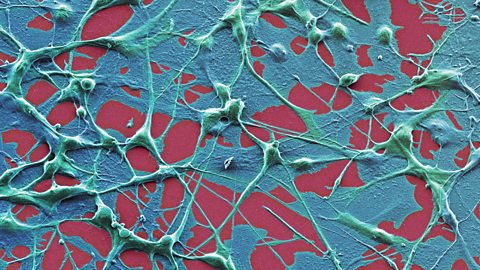Higher tier: The effects of radiation on the human body
Radioactive materials are hazardous.
Radioactive emissions cause dangerous ionisationProcess by which electrons can be added or removed from an atom to create an ion. by removing electrons from atoms.
When this happens with molecules in living cells, the genetic material of a cell (the DNAThe part of the cells of living things that carries information about how they look and function. Everyoneâs DNA is different, except identical twins who share the same DNA.) is damaged.
This can lead to cancer.
Radiation can also deposit large amounts of energy into the body, which can damage or destroy cells completely.

Very high doses of radiation can kill cells completely.
We use this property of radiation to kill cancer cells as well as harmful bacteria and other micro-organisms.
Alpha, beta and gamma radiations are all examples of ionising radiations.
- Alpha particles are highly ionizing but are easily stopped and donât travel very far.
- The ionizing power of gamma rays is low, but they are difficult to stop and travel long distances.
The degree to which each different type of radiation is most dangerous to the body depends on whether the source is outside or inside the body.
If the radioactive source is inside the body, perhaps after being swallowed or breathed in:
- alpha radiation is the most dangerous because it is highly ionizing and is easily absorbed by cells;
- beta and gamma radiation are not as dangerous because they are less ionizing and unlikely to be absorbed by a cell. They will usually just pass right through it.
If the radioactive source is outside the body:
- alpha radiation is not as dangerous because it is doesnât travel very far and is unlikely to reach living cells inside the body;
- beta and gamma radiation are the most dangerous sources because they can penetrate the skin and damage the cells inside.
Some of the effects that radiation has on a human body are shown below.
| Eyes | High doses can cause cataracts. |
| Thyroid | Radioactive iodine can build up and cause cancer, particularly during growth. |
| Lungs | Breathing in radioactive gas can damage DNA. |
| Stomach | Radioactive sources can sit in the stomach and irradiate for a long time. |
| Reproductive organs | High doses can cause sterility or mutations. |
| Skin | Radiation can burn skin or cause cancer. |
| Bone marrow | Radiation can cause leukaemia and other diseases of the blood. |
| Eyes |
| High doses can cause cataracts. |
| Thyroid |
| Radioactive iodine can build up and cause cancer, particularly during growth. |
| Lungs |
| Breathing in radioactive gas can damage DNA. |
| Stomach |
| Radioactive sources can sit in the stomach and irradiate for a long time. |
| Reproductive organs |
| High doses can cause sterility or mutations. |
| Skin |
| Radiation can burn skin or cause cancer. |
| Bone marrow |
| Radiation can cause leukaemia and other diseases of the blood. |